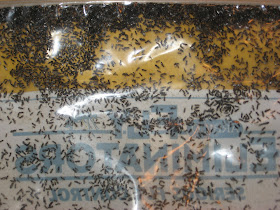Fly Eliminators are gnat-sized parasitic wasps that feed upon and breed within developing (pupal) stages of manure breeding flies, eliminating the adult pest fly. The adult female fly lays her eggs wherever there is decomposing organic material. Within a short period of time, the microscopic larvae (maggot stage) burrow into the manure and eventually develop into pupae (cocoon stage).
Pest flies reproduce at a faster rate than Fly Parasites; therefore, Fly Eliminators must be replenished on a regular basis.
We recommend releasing a shipment of Fly Eliminators every 3 to 4 weeks under a fly control program that lasts throughout the duration of the fly season. Releases ranging from 1-6 weeks, however, are not uncommon. Quantity required and frequency of application can vary according to severity of fly problem, neighbors, manure management, number of animals and start date of program. Choose from one of our zone- specific programs below or ARBICO’s experienced staff can tailor a program to fit your particular needs.
How to apply: Fly Eliminators are shipped as parasitized fly pupae in wood shavings. When received, check for evidence of hatching. Once a few have hatched, simply disperse small handfuls or scoops around your property into “hot spot” breeding areas: Manure piles; under water troughs; below bedding; corners of pens and paddocks, and feeding sites. Cover with dirt or manure to protect pupae.
| • Watch Our Video – See how Fly Eliminators are used to control flies around your horse property. Fly Eliminator Release Video |
| HOW TO SELECT YOUR FLY CONTROL PROGRAM | |
| Find Your Fly ZoneYou may have to shift up or down a zone depending on your particular elevation and microclimate. Note: Dates shown on the map are our suggested start and end dates. Start anytime during the fly season. | |
| ||||||||||||||||||||||||||||||||||||||||||||||||||||||||||





Very interesting. Last year we seemed to have few flies, this year more, so I've been contemplating what to do. I got a chuckle out of the chickens eating the good guys. Chickens are like that! I take it the little wasps simply stay put and keep on making more wasps? I'd be afraid they'd all migrate elsewhere.
ReplyDeleteAre they pricey?
ReplyDeleteThanks for the comment. I'm new to blogging and it is exciting to get a comment. The fly eliminators are so tiny, you really can't see them. I think their life cycle is short. When you are outside, even after spreading, you don't see them. They aren't like a biting gnat that is flying around. Thanks.
ReplyDeleteThe prices are on the website with all the ordering information. It depends on the amount of animals you have. Thanks.
ReplyDeleteMy friend at work suggested these to me, but with a different company. She has great sucess using them in her horse paddocks.
ReplyDeleteDepending on how many animals and what type depends on how many you need. I signed up for a 6 month "subscription" plus a thing that looks like a bait bucket for 125.00. I've found that it's working pretty well in my chicken/rabbit area.
Thanks for the comment. They do work! This Arbco Organics also has a good natural fly spray too.
ReplyDeleteThis is very interesting. I am not a fan of the word "wasp," (immediately think stinger, I don't care how small) but actually wasps are less bothersome than flies. I wonder if they provide other benefits as well, besides being a treat for the chickens.
ReplyDeleteIf they would cut down on mosquitoes as well I'd be a fan for life!